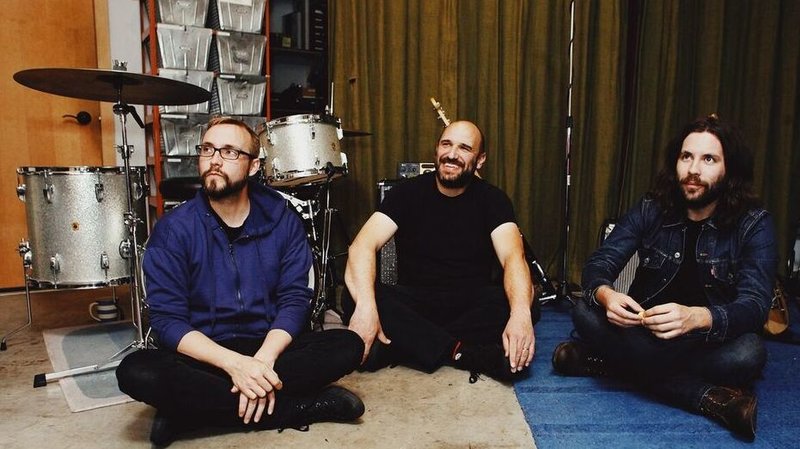I’ve listened to Pedro the Lion since the very beginning – all the way back to the Whole EP on Tooth and Nail Records in 1997. I don’t lead with this fact to gain scene points, much less to stake some sort of claim as an expert in the band. I do so because I am a fan of the music. Full stop. No apologies.
In fact, I believe critics should be upfront with their biases and that they should embrace them. Not only does this help them project honesty to readers, but more importantly, it helps them dig deeper into themselves to understand the whys and hows of the music being examined, not just the whos and whats.
Such an approach is of crucial importance when contending with a songwriter like David Bazan, someone who’s spent decades diving headlong into bracing honesty and dark self-reflection. Some albums have contained singular story arcs about a fictionalized character akin to Denis Johnson. Others have been the musical equivalent of short story collections in the vein of Flannery O’Connor. Still others have resembled personal journal entries or confessionals like Thomas Merton.
In short, the man has never shied away from heavy topics or ruminations about significant concepts.
The story of how Bazan decided to resurrect his Pedro the Lion moniker after 15 years is a good one. He reflects upon the decade-plus of touring under his own name, especially the long nights alone on his multiple house show tours. But after a memory-filled visit to his hometown of Phoenix, AZ in 2016, he decided to revisit how he used to make music under that old name in search of a fresh creative spark.
And let me tell you – he definitely found it on Phoenix.
As you might imagine, the name of the album did double duty as a reference to the city and creative rebirth, but Bazan refused to rest on such obvious metaphors or allusions. He chose instead to pen personal stories about his childhood and imbue them with universal application and resonance, the sort that encourage the listener to dredge up their own bittersweet memories.
Musically, the songs are a natural progression of Bazan’s style and songwriting. It’s intimate without feeling treacly or intrusive, and it refuses to retreat into old habits out of rank sentimentality. Like any good Pedro the Lion album, singable melancholy and strong hooks are the feature elements. The vintage guitar-bass-drums rock production is muscular without whacking you over the head with some sort of bombastic “This is how indie rock should sound!” sentiment.

What I found most striking about Phoenix is how it’s easily the most lyrically extroverted album in Bazan’s canon. He doesn’t hold back on personal reflections, using them as a way to discuss many of the same spiritual and religious themes visited on his short-lived Hard Feelings podcast from 2018. Where Curse Your Branches felt like a father allowing us to peek at his journal for a few moments, this album resembles a songwriter openly sharing his story in a group therapy session.
It’s a shocking and refreshing way to make music, especially in an era where social media seems to encourage us to overshare our thoughts and feelings for the sake of personal aggrandizement.
It’s as if I can hear him saying, “Here are my hard stories. I hope they can help you address the hard stories in your life. No judgment.”
I stand in awe of how expertly this album was tracked and paced. It pricked the exact right emotion at the exact right time, as one song flowed into the next to chronicle the story of the Bazan Family in 1980’s Phoenix.
- After a sweet instrumental intro, “Yellow Bike” kicks things off in high gear, drawing parallels between the childhood freedom of riding one’s bike around the neighborhood and the hard life of a touring indie musician.
- With “Clean Up,” we’re encouraged to take care of our own shit and be responsible for your actions.
- “Model Homes” reflects upon the realities of lower middle-class life, constantly seeking that next step up the socioeconomic ladder, even thought you really know you’ll never take it.
- On “Circle K,” the story of a kid who wants to save up for a Santa Cruz skateboard but instead spends his savings on convenience store snacks is conveyed in gut-wrenching fashion.
- For “Black Canyon,” Bazan shares the dark tale of his paramedic uncle arriving on the scene of a man who attempted suicide by getting hit by a truck on a highway.
- “Leaving the Valley” closes out the album with a paean to his family moving into a new home, complete with reflections upon whether or not one can ever really be “home.”

To be sure, as someone who’s seen Bazan play nearly 20 times, his shows have always possessed a rich emotional core. As I’ve written before, his own progression out of evangelical Christianity has served as a mirror and stand-in for other ex-evangelicals (including me!). There’s nothing like hearing 100 people sing along with him in hushed tones as if he were singing their own thoughts back to them.
What sets Phoenix apart from earlier Pedro the Lion efforts is its depth of heart, honesty, and transparency about the human condition. An overall resplendent album that stands as a testament to the power of memory and story, it’s an early contender for one of my favorite albums of 2019.





